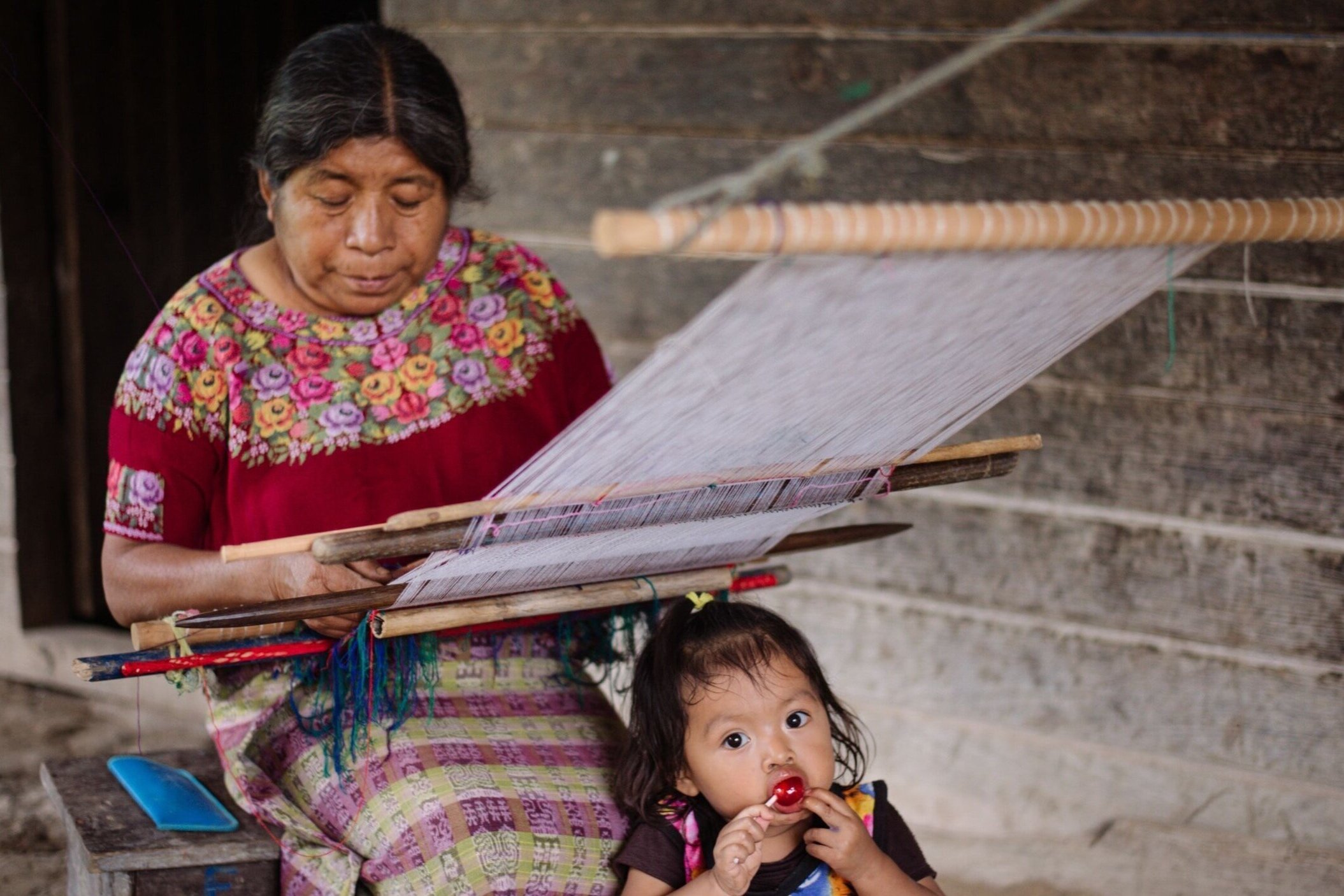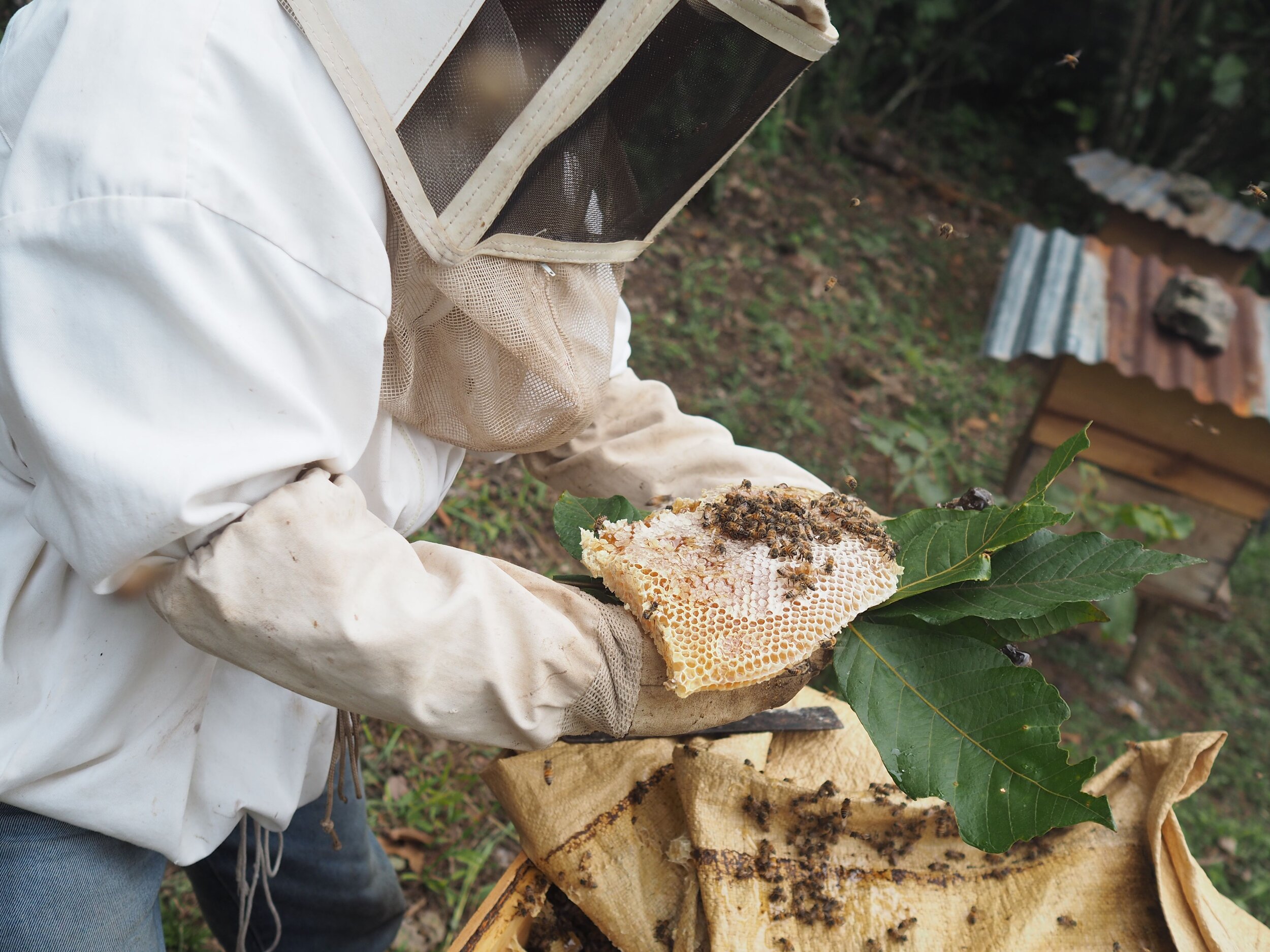We thrive when farmers thrive: Our commitment to the Maya Ixil coffee cooperative
In a remote town nestled in the Cuchumatanes mountains of Guatemala, Ana Cordoba Ostuna is working a loom, weaving as one of the youngest town residents, her granddaughter, enjoys a lollipop while sitting at Ana’s feet.
They live in Nebaj, more than 6,200 ft into the mountains, and Ana is the matriarch of a farming family that makes up part of the Maya Ixil coffee cooperative. Until recently, the local farmers made almost all of their income by growing and exporting coffee. Now, Ana’s weaving is part of a growing new livelihood for her family and her town, where the cooperative farmers add sewing and beekeeping to their coffee farming work.
The Maya Ixil cooperative, with support from Food 4 Farmers and local organizers, has become a model for sustainable practices that grow more than food—they grow opportunity.
Farming is fundamental
When you think about coffee, maybe you think of your local cafe or the smell of freshly ground beans.
For most of us, what we don’t think about is farming. But of course, that’s where your cup begins—in rows of small trees, covered in red berries, harvested by farmers and transported globally.
Farming is fundamental. From fruits and vegetables to cotton and coffee, it’s strangely easy to forget that we thrive because someone else farms.
That’s where fair trade cooperatives like Maya Ixil, local community organizers and international organizations like Food 4 Farmers come in. And, that’s where you and I come in too.
Ensuring farmers and food systems thrive
In a sustainable system, farms supply communities with fresh food all year while ensuring that the farm itself can thrive. But sometimes the system breaks down. What causes that? It’s complicated, and we don’t have all the answers, but organizations have identified two culprits that we can work to change:
Single-crop farms—When farms grow only one or two crops, or have one main crop like coffee, corn or wheat, farmers can find themselves at the mercy of global price fluctuations or crop diseases, like coffee leaf rust. If the main crop fails or the price drops unexpectedly, the farmers lose their primary source of income.
Climate change—Flooding, fires, hurricanes and drought have potentially devastating effects on farmers. This needs little explanation, except to say that these dangers have increased each year.
Farming cooperatives, with support from people served by farming (that’s all of us), work to help farms cultivate additional crops and livelihoods.
The members of the Maya Ixil cooperative have gotten the gear, training and support necessary to add beekeeping, sewing and home gardens to their family farms. According to Food 4 Farmers, “Farmers in the program have increased their monthly income by 23% on average.”
“So far, 49 beekeepers have harvested nearly 10,000 pounds of honey in 2020, 25% more than 2019's production. On average, farmers produce about 200 pounds of honey, and own 9 hives.“
How CoffeeSock is partnering with Maya Ixil
CoffeeSock has been deeply invested in using organic and fair trade materials in our work, and the filters themselves started as an effort to reduce trash in the world and combat climate change. (Read our blog on Why Organic Cotton and our spotlight on the organic cotton thread we use.)
The “sock” part of CoffeeSock owes its origin to the Costa Rican “chorreador” - a simple cotton bag attached to a wire. We discovered this marvel of a tool while on vacation in the mountains of Costa Rica, where we visited coffee farms and brought home a new mission to preserve and support the earth’s beautiful landscapes and rid the world of paper coffee filters.
In 2020, we’ve expanded that commitment, partnering with Food 4 Farmers through 1% for the Planet, to donate at least one percent of our sales to support the continued growth of Maya Ixil’s cooperative model.
For now, that means continued support of the bee keeping and sewing projects at the cooperative’s farms. Beginning in January 2021, CoffeeSock support will help the project expand to include The Grow Ahead venture, providing the seeds, materials and education needed to grow food crops, replant the local forests and restore native ecosystems.
Maya Ixil is buzzing
According to Food 4 Farmers, after the coffee leaf rust crisis hit the Ixil region, Ana Cordoba Ostuna’s husband and son had to leave the farm to find work at construction sites and as day laborers on other farms. After joining the Maya Ixil cooperative’s beekeeping program, they now have eight bee hives and plan to get more. Ana now says, “With the bees we are happy again, because they have given us the hope of a better life.”



